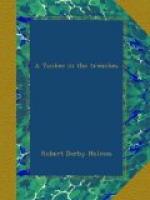Blofeld was most democratic. He shook hands with the new men and said he hoped we’d be live wires, and then he told us what he wanted. There was to be a raid the next night and he was looking for volunteers.
Nobody spoke for a long minute, and then I offered.
I think I spoke more to break the embarrassing silence than anything else. I think, too, that I was led a little by a kind of youthful curiosity, and it may be that I wanted to appear brave in the eyes of these men who so evidently held me more or less in contempt as a newcomer.
Blofeld accepted me, and one of the other new men offered. He was taken too.
It turned out that all the older men were married and that they were not expected to volunteer. At least there was no disgrace attaching to a refusal.
After Blofeld left, Sergeant Page told us we’d better get down to “kip” while we could. “Kip” in this case meant closing our eyes and dozing. I sat humped up in my original position through the night. There wasn’t room to stretch out.
Along toward morning I began to itch, and found I had made the acquaintance of that gay and festive little soldier’s enemy, the “cootie.” The cootie, or the “chat” as he is called by the officers, is the common body louse. Common is right. I never got rid of mine until I left the service. Sometimes when I get to thinking about it, I believe I haven’t yet.
CHAPTER III
A TRENCH RAID
In the morning the members of the raiding party were taken back a mile or so to the rear and were given instruction and rehearsal. This was the first raid that “Batt” had ever tried, and the staff was anxious to have it a success. There were fifty in the party, and Blofeld, who had organized the raid, beat our instructions into us until we knew them by heart.
The object of a raid is to get into the enemy’s trenches by stealth if possible, kill as many as possible, take prisoners if practicable, do a lot of damage, and get away with a whole hide.
We got back to the front trenches just before dark. I noticed a lot of metal cylinders arranged along the parapet. They were about as big as a stovepipe and four feet long, painted brown. They were the gas containers. They were arranged about four or five to a traverse, and were connected up by tubes and were covered with sandbags. This was the poison gas ready for release over the top through tubes.
[Illustration: A heavy howitzer,
under camouflage. Copyright, by
Underwood & Underwood, N.Y.]
The time set for our stunt was eleven P.M. Eleven o’clock was “zero.” The system on the Western Front, and, in fact, all fronts, is to indicate the time fixed for any event as zero. Anything before or after is spoken of as plus or minus zero.
Around five o’clock we were taken back to Mechanics trench and fed—a regular meal with plenty of everything, and all good. It looked rather like giving a condemned man a hearty meal, but grub is always acceptable to a soldier.




